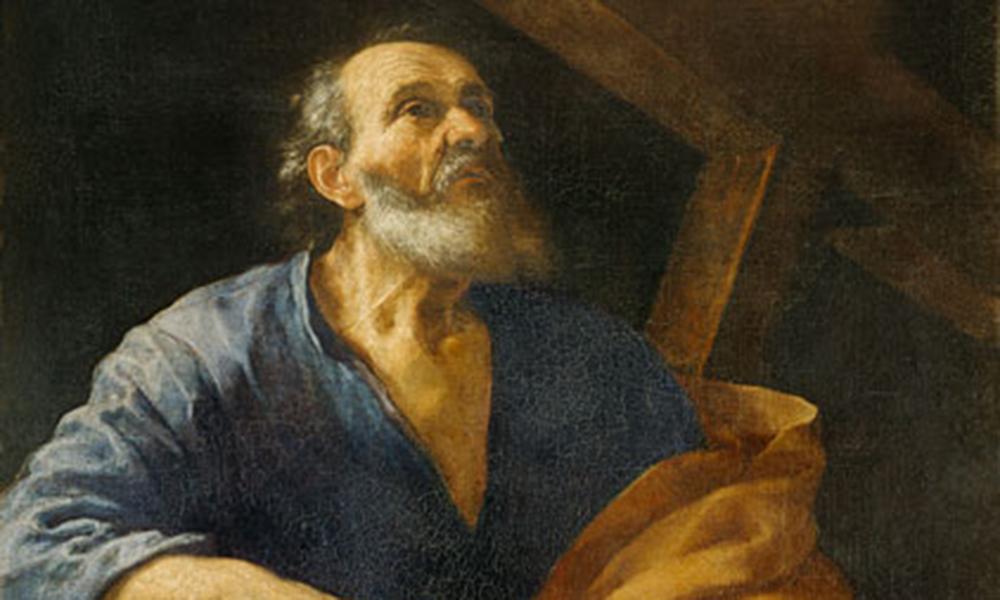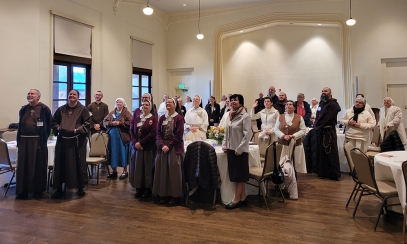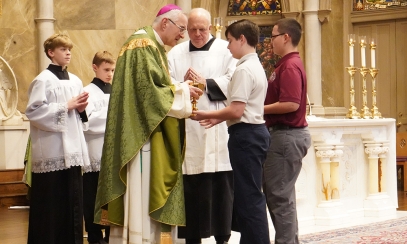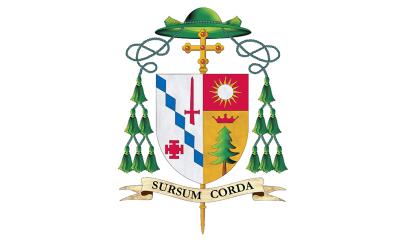
September 12, 2021 Homily
‘Who Do You Say That I Am?’
‘Who Do You Say That I Am?’
My dear sisters and brothers,
Yesterday, we recalled the 20th anniversary of the tragic events that struck our country: the 9/11 attacks on the World Trade Center Twin Towers in New York City, the Pentagon in Washington, and the countryside in Shanksville, Pennsylvania, and other thwarted attempts. These cowardly events took about 3,000 lives shocking our nation in a reflection on its nature and purpose. The effects of 9/11 reverberate today. I especially think about those incidents which awakened our consciousness to the seriousness with which we live our lives. We ask ourselves: What is important? What is less important? As a Christian and Catholic, I also ask myself: Is it possible to live this way – the way Christ left us? I remember it so distinctly: like the pandemic today, the security of our lives gave way to insecurity. We felt vulnerable and alone. At that time, we felt helpless and alone.
In 2002, I was serving at the graduate house of the North American College in Rome. Afterward, I remember the moments of silence we had with the priests with whom I lived and our Italian staff as we recalled with horror these events. One of the Italian staff made a wise observation that I’ve never forgotten. She said, “Monsignor, if America is not free, then we [Italians] are not free.”
We began to look for something, to search for answers, to stabilize the order of the global community and begin to rise from the ashes. Many stories can be recounted. One person recalled that people began streaming toward the Cathedral [in Lansing] shortly after the tragic events. I’m sure this happened in many places whenever tragedy like this strikes. People go back to the basics and search for something, something solid, a point of reference, a north star, a firm foundation, a ground that’s secure and certain.
All this leads me to think about today’s Gospel when Jesus asked a foundational question to His disciples? “Who do people say that I am?” I often imagine the people that met Jesus were searching for something too. Life was not easy. Sometimes they could articulate the question clearly. Other times, like last Sunday with the deaf man, others had to articulate it for him.
Then, Jesus asks the disciples: “Who do you all say that I am?”
Amazing again, it is Peter himself, speaking on behalf of everyone there, who would provide the insightful answer: “You are the Christ!” That is, the “Messiah” – the “One we’ve been looking for!” Here was a testimony of faith – an early creedal statement. Their belief was not a speech, not in a doctrine, not written in an ancient scroll, nor part of an ethical / moral code. They found their answer in a person – right before them.
Now, let’s take a look at Peter for a moment. Here’s an intriguing figure in the Gospels – a super-fisherman who never seems to catch any fish, except when Jesus tells him where to lower the nets. He’s a bold and oftentimes impetuous character who asks Jesus to tell him to come to Him on the water. And then, when he does, he starts sinking. He confidently tells Jesus, “God forbid, I will never deny You!” … but then does so. Still, he’s the one who explains a position on behalf of the disciples, assuming a position of leadership among them. He responds to this question, “Who do you [all] say I am?” with “You are the Christ!” the One we talked about, the One we hoped for. Now You are here, in front of us, and we recognize and acknowledge Your presence.
These disciples longed for someone who would be able to respond to their deepest longings and answer their question. In other words, they found in Him something that corresponded to their hearts. Consider, if you will: they ate with Him; they walked with Him; they heard Him speak the parables about the kingdom; they saw Him heal and perform unexplainable miracles. He was a remarkable person who attracted their interest. So much so, that anyone who met Him had to ask himself or herself, “Who is this man?” As a result, they kept coming back because slowly they began to understand, for all their imperfections, with this man there was the certainty; there was hope; there was a future that they couldn’t even imagine.
With that being said, the same question is posed to each of us today. “Who do people say that I am?” “Who do you say that I am?” “Who is this person Jesus Christ for you?”
Is Jesus a superstar? Is He a wonder worker who performs spectacular miracles? Or a social worker? What brings you here week after week? The question, “Who do you say I am?” is far deeper than having a mere acquaintance with the person. It is seeing something beyond the surface.
For myself, I come before the Lord often because I realize that I need something I cannot give myself. And I continue to search for that something that will fulfill me totally and completely, beyond the temporary fulfillments I’ve experienced in my life. In that sense, I become like the beggar, knowing his needs, as one who is constantly looking for what will fulfill it.
As the disciples began to find out, and as we, believers, today discover, the more we acknowledge Christ and let Christ into our lives – or the more we conform our lives to His - we realize, like Pope Benedict told young people, that we “lose nothing… absolutely nothing of what makes life free, beautiful and great.” But we gain so much more. We gain a true friend, a point of reference, in our pilgrim journey through this life.
Over these past years, we have been looking for hope. It was that way in our last election cycle and now as we make our way through this seemingly never-ending pandemic. It is amazing when you think about it: for all our intelligence, strength, creativity, good will, virtue, dedication, and honor, where we can land a man on the moon and send telescopes to the far reaches of the universe to reveal its secrets, no human being can solve the ultimate problems of this life – sickness, death, lasting peace, and total personal fulfillment, to name a few! How many times have we been disappointed in the reductive solutions we have tried so far? Even the disciples were confused at times until they grappled with the event of Christ! He was a game changer. They had never met anyone like Him before.
So, who is Jesus for me? Each person here must answer that provocative question. He lived. The disciples knew Him personally. He left us – not alone … He left us Himself: “I am with you always.” My dear friends, He is here, present today – accompanying us. In recognizing Christ, we recognize the “something more.” Our hope is leading us to ultimate union with Him.
This encounter with Christ does not mean an escape from our daily lives in whatever arena it is lived in. Perhaps even better, those who met Christ and answered that basic question somehow radically transformed life on this earth. There was newness; there was hope. Hospitals, orphanages, schools, the concept of human rights, science, music, art, and architecture all have their roots in that life built on the hope given by having met Christ. Once we recognize Him, life changes for the good and for freedom.
Here at the Cathedral, in our community, the Gospel challenges us once again to answer an essential question about our Lord, which gives us our Christian identity. We know that our imperfections, individually or as a parish, or as a diocese, state or nation should help us to understand that only with Christ, there is hope, there is mercy, there is joy.
And it begins with those words of Jesus to Peter, “Who do you say that I am?” These words take Peter to the depths of a new world before him, as it is with each of us today. It will start us on an adventure that is so amazing and unbelievable that we will begin to see Christ popping up all over – every day in the events of life.
Like Peter and the disciples, I urge you to beg for the grace this week to answer the question: “Who is Jesus for you?” In that way we may have the awareness of Christ present today who is the certainty as well as the fullness of mercy and hope for our future!
May Mary, our Blessed Mother, whose most holy name we recall today, guide us in life toward her Son, who is Christ, the Lord.



